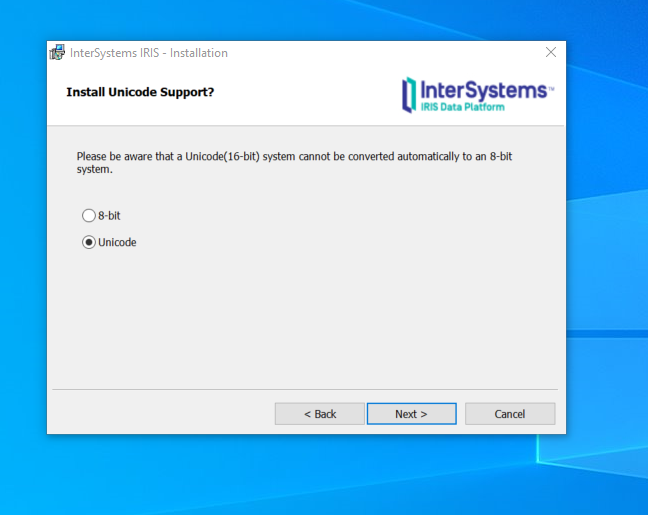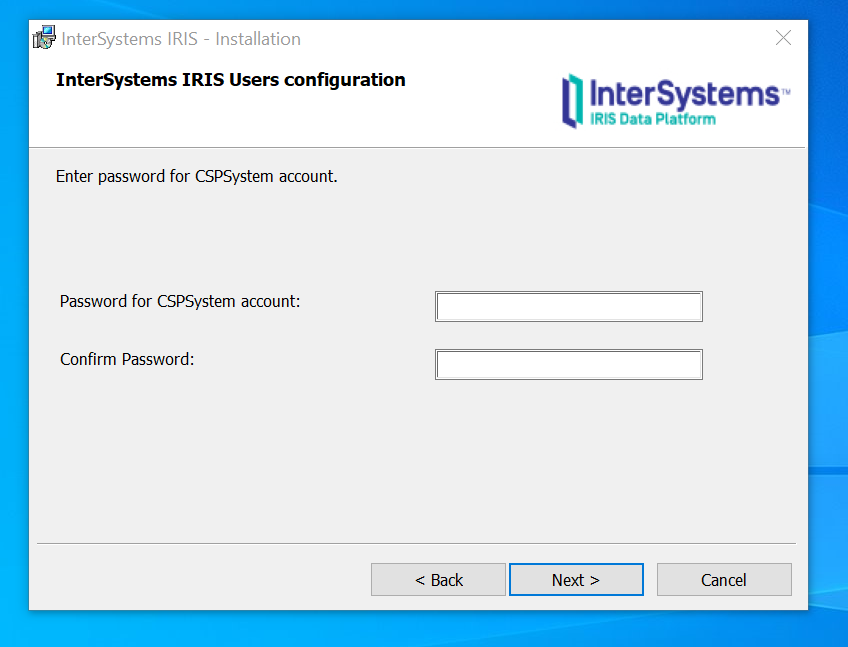1. Is there documentation for Track care configuration settings.
2. In Clinical Viewer where I can go and change the size of labels, I am not getting in any settings available in track care.
1. Is there documentation for Track care configuration settings.
2. In Clinical Viewer where I can go and change the size of labels, I am not getting in any settings available in track care.
At the heart of IRIS and Cache is a very interesting database architecture that we, at M/Gateway Developments, refer to as "Global Storage". If you ever wanted to know more about the fundamentals and capabilities of this underlying database, you might want to read a major analysis we've put together:
https://github.com/robtweed/global_storage
Amongst other things you'll discover that:
- Global Storage provides the underpinnings of a full multi-model database, something we refer to as "Universal NoSQL", though, as you already know from IRIS and Cache, it also supports relational too.
- Global
Hello,
I was wondering if InterSystems has support for the following standards built into IRIS or Health Connect / Ensemble:
1. Healthcare FHIR(Fast Healthcare Interoperability Resource) Protocol
2. Enterprise Resource Planning OAGIS (Open Applications Group Integration Specification) Protocol / Supply Chain Management GS1-EPCIS (Electronic Product Code Information Services)
3. Education, Certification, Credentials FERPA CEDS (Common Education Data Standards) Protocol
4.
“It is a set of hardware infrastructure, software, tools and resources to implement, administer, manage and execute data operations in the company, including, acquisition, transformation, storage, distribution, integration, replication, availability, security, protection , disaster recovery, presentation, analysis, preservation, retention, backup, recovery, archiving, recall, deletion, monitoring and capacity planning, across all data storage platforms and enabling application use to meet the company's data needs company". (Alan McSweeney)
The Data Fabric is a new way to
I am pleased to announce the availability of InterSystems Container Registry. This provides a new distribution channel for customers to access container-based releases and previews. All Community Edition images are available in a public repository with no login required. All full released images (IRIS, IRIS for Health, Health Connect, System Alerting and Monitoring, InterSystems Cloud Manager) and utility images (such as arbiter, Web Gateway, and PasswordHash) require a login token, generated from your WRC account credentials.
Hey developers,
The registration period for the FHIR Accelerator programming contest is in full swing! We invite all FHIR developers to build new or test existing applications using the InterSystems IRIS FHIR Accelerator Service (FHIRaaS) on AWS.
And now you have a great opportunity to get FREE access to the FHIRaaS on AWS! So, to take the first step in mastering the FHIRaaS, you need to register on our FHIR Portal using this link:
👉🏼 https://portal.trial.isccloud.io/account/signup

Can somebody give examples of $Order and $Query and there application? When to use $Order and $Query????
Hi Developers,
Get a preview of the upcoming Embedded Python feature of InterSystems IRIS:
Hello everyone :-) A colleague wants to use data got from a stream into another type of object: %xsd.base64Binary (related to a webservice context).
His code works for regular data, but the following error appears when parsing large streams (~43 MB): "ERREUR #5002: Erreur Cache: <MAXSTRING>"
Here is below his code:
Class (...).StampDataRequest Extends Ens.Request [ ProcedureBlock ]
{
…
Property DocumentData As %xsd.base64Binary;
…
}
Method OnRequest(pRequest As Ens.StreamContainer, Output pResponse As Ens.Response) As %Status
{
...
set fileStream = ##class(%Stream.GlobalChar
Title: IRIS DBA
Location: pleasanton,ca remote work from united states only
Duration:12+months
Skills: intersystems Iris, cache and health care background
When parsing a text file into a mumps routine I get this error
<FUNCT>Method+2^%CDCalBk
Any idea what can be causing this
Thanks in advance
I am looking for if any configurations are available to display the Lab Results Flag from abnormal to low or high based on the results. Below is the snapshot of the example, Result is 1.5 and reference range is 0.28-1, So if i want to display this as High, are there any config available in track care or layout editor.
.png)
Hi, the hospital has deployed a set of TrakCare, but there is no document about TrakCare, including the implementation document of InterSystems installation of TrakCare and relevant management and maintenance documents. Could you please provide them?The hospital bought a complete set of products, should have relevant use documents.At the very least, there should be a relevant basic manual.
Hello everyone,
I have a question, I am trying to use xecute command, but something wrong happen when i was using the command, and i don't know why hahahaha.
I created a file .mac with this code:
label(test) public{
set routine="variable"
set call="write routine,!"
xecute call
quit
}But when i run the command, show me this message error:
<UNDEFINED>label+3^tstFJR3 *routineAfter that i changed the code to:
label(test)
set routine="variable"
set call="write routine,!"
xecute call
quitThis solved the problem to me, and writed this content:
vI'm moving onto a new role soon and my System integration lead post has become available.
So please apply to come and work for a challenging, hard working and dedicated solutions team as a System Integration Lead at East and North Hertfordshire NHS Trust.
At ENHT we're on an exciting digital transformation journey and in this role you'll be key to helping deliver this.
Please see full details on the link below:
With the release of PEX in InterSystems IRIS 2020.1 and InterSystems IRIS for Health 2020.1, customers have a better way to build Java into productions than the Java Business Host. PEX provides a complete set of APIs for building interoperability components and is available in both Java and .NET.
The Java Business Host has been removed from InterSystems IRIS and InterSystems IRIS for Health as of their 2020.4 releases. Customers using the Java Business Host are encouraged to migrate to PEX.
Advantages of PEX
Hi Developers,
It's time to announce the Winners for April 2021! Please welcome our awesome Global Masters Heroes!
The storm of applause goes to these developers and their great contribution to DC in April 2021:
🥇 @Dmitriy Maslennikov, Co-founder, CTO and Developer Advocate, CaretDev Corp, Russia
🥈 @Lorenzo Scalese, Solution Architect, Zorgi, Belgium
🥉 @Robert Cemper, ex Senior Sales Engineer from InterSystems, Austria

Learn more about the competition and our awesome winners below.
Hello everyone,
We are trying out lists inside persistent classes. Because we may need to use them in a very close future.
So far, I managed to create a class that has a list property which has an indice.
Here is the class in question:
Class User.TestList.Data.Titre Extends (%Persistent, %Populate){Property numTitre As %Integer;
Property millesime As %Integer;
Property codeProduit As %String;
/// Old field which will be replaced by the next oneProperty numDossierMER As %Integer;/// New field which is a listProperty numDossiersMER As list Of %Integer;Index titreIdx OnHello Community,
we read data from an Oracle database. The desired order is created by an 'order by' in the sql statement. The individual elements of the result set are converted into objects and inserted into a parent object using 'insert' on a property, which implements a one-to-many relationship with the result objects. Later, we iterate over the objects in a for loop and process the contents. At this point the order is apparently no longer identical to the order in which the elements were inserted.
The fundamental question at this point: Is the described relationship aware of the concept of
I have a requirement to update the Ensemble Host Settings Programmatically. Mainly the "AlertOnError,QueueCountAlert,QueueWaitAlert,InactivityTimeout" settings.
I used Ens_Config.Item (persistent) class to get the settings (list object) and then update it. But for some of the Business Host's, I dont see the above settings in the table, but present in Settings of that particular Host in Ensemble Management Portal. So my logic is not working.
Why is that and how to write a code to update the above settings for all the hosts ?
Please let me know the way to achieve my requirement.
My code.
&SQL(SELE
I'm looking for a SQL function equivalent for SQL server STRING_SPLIT. I have records like this:
join_to_tx_history (key), ss_note_multi_dict_1_value (varchar)
| 64559.001 | Assistant Principal, Case Worker, Client, Dad, Daughter, Mentor, Mom, Other, Principal, Psychiatrist, School Counselor, Teacher |
and I like the field ss_note_multi_dict_1_value split to rows for each comma delimited value. So I can get this:
64559.001 Assistant Principal
64559.001 Case Worker
64559.001 Client
64559.001 Dad
64559.001 Daughter
64559.001 Mentor
64559.001 Mom
64559.001 Other
64559.001
Hey Developers,
Enjoy watching this new video on InterSystems Developers YouTube:
⏯ Demo of REST APIs defined in Swagger, built with InterSystems IRIS interfacing with a SQL backend
Hello everyone, I can choose between RSA and DSA. ECC seems to be unsupported. Is there any workarounds without using external binary like curl?
Best regards RY
Hi all
I'm trying to recreate this method below in Cache/IRIS.
https://en.wikipedia.org/wiki/Luhn_mod_N_algorithm ISO-7812-1 (LUHN-10)
I've been following the javascript example. It seems simple in theory but i'm struggling with which cache methods to pick.
$LENGTH, $System.SQL.FLOOR() - seem ok
$EXTRACT - I think for .charAt (though may need to correct base)
$FIND - for .indexOf
Any suggestion which would be the best ones for the job?
Thanks
Dan
Hello,
I created a custom business operation to copy PDF files in Intersystems Healthshare. To copy the files I used:
$ZF(-100, "", "cp", "-f", tSource, tTarget)
tSource contains the source file e.g. "/opt/var/data/dir/1821008687135422926_5849146876.pdf".
tTargetSource contains the target file "/opt/targetdir/Müller_Jörg_1821008687.pdf".
Copying files without german Umlaute works fine (e.g Smith_Robert_1821081542.pdf), but when the string contains special characters like "ä", "ö", "ü" or even "ß" copying is not successful.
Do I have to replace the special characters or is there a possibility to
Let's imagine if you would like to write some real web application, for instance, some simple clone of medium.com. Such sort of application can be written using any different language on the backend side, or with any framework on the frontend side. So many ways to do the same application, and you can look at this project. Which offers a bunch of frontends and backends realizations for exactly the same application. And you can easily mix them, any chosen frontend should work with any backend.
Let me introduce the same application realization for InterSystems IRIS on a backend side.
Hello there developers,
As I started to install the IRIS for community editing I came across this interface. (Image attached below)
Is there a major difference in these 2 types of installations and is there a place where I can refer with regard to this in detail please?
Please let me know.
Thank you in advance.

Hello Community,
On the installation process of the IRIS Community Edition I came across an interface as below (image attached.)
I would like to know what it means, what is the use of it, what it is and where can i know more on this?
I tried the documentation page but was not successful in finding anything regarding it.
I would like to know more on it please.
Hoping to hear soon.
Regards.

We use the Category drop-down for other IT analysts to quickly see interfaces related to their application/group. This drop0down fails to work (IDs get out of sync with Config Item IDs) if the Production is compiled. There is no fix available (development was started, but stopped in favor of other items).
Has anyone else run into this issue? Any custom work-arounds?
Example:


Thanks.
Hi Team,
Can you please provider some example how to Create ACK/NACK for HL7 ORU ?
Thanks,
Ankur Shah